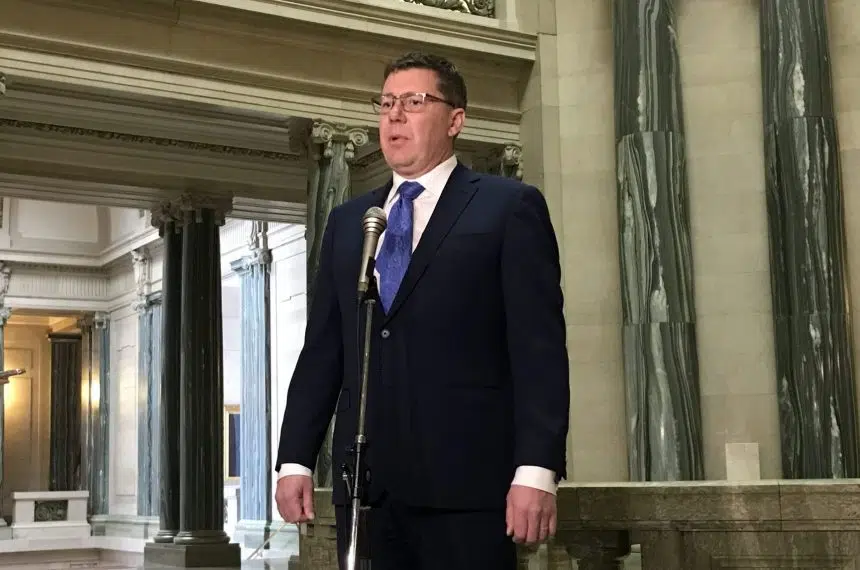One day after announcing an infrastructure top up for municipalities, Premier Scott Moe touted how the Saskatchewan Party government’s handling of the province’s finances over the last four years allowed the plan to happen.
Speaking on Gormley on Thursday morning, Moe said the $2-billion addition to the program, to be spent over two years, was made possible by balancing the province’s operating budget.
“It has put us in a very, very good position where we’re able to capture some of the lowest interest rates in the nation. In a time of financial turmoil worldwide, we’re actually able to access some dollars to be able to deliver a program like this,” Moe said.
“Not every province, not every jurisdiction in the nation or around the world is actually able to do that when we’re in some very unstable times.”
During a COVID-19 update last month, the premier pointed out that Moody’s had kept the province’s credit rating at AAA.
The funding announcement Wednesday — described by Moe as a booster shot — comes on top of $5.5 billion already set aside for capital projects.
About $1.37 billion will go to large projects, including $103 million for health and $110.5 million for education.
The goal, Moe said, is to get people back to work but also to be a long-term investment.
“It’s to ensure we are constructing significant infrastructure that’s important, not only to the services that are provided in our communities — schools, hospitals, highways — but also the opportunity to construct infrastructure that is going to provide us with the opportunity to expand our economy,” he said.
Regina Mayor Michael Fougere was pleased with the announcement, as the city could see about $30 million of flexible funding through the Municipal Economic Enhancement Program.
He said the additional funding will help the city start projects in transportation, recreation and utilities.
“We see this as being a very flexible and rapid response to providing economic stimulation which we all want to see,” Fougere said Wednesday.
“Those shovel-ready projects that are really important, we can begin to add to the list that we’ve already approved for our already-approved capital budget for 2020-21 in 2020.”
NDP Leader Ryan Meili also applauded the top up, but said the projects should be built by Saskatchewan workers.
“When we build our roads, our hospitals, our power plants, our schools with our tax dollars, we should absolutely be doing that with our companies and our workers,” he said.
Meili also said he wanted to know how projects get chosen, saying there has been “lack of interest from the premier thus far in any discussion of getting back to some form of legislative accountability.”
Getting the legislative assembly to meet in some form is something political scientist Jim Farney said should happen.
“We’ve seen a big dust-up federally over virtual (meetings). Is it committees (or) meetings in person? All of that I think we have a lot of flexibility with because we have such a small legislature,” Farney told the Greg Morgan Morning Show on Wednesday.
“But we need debate over spending plans for the years because it’s not like COVID has taken over the whole budget. There’s still everything else government does.”
He added the opposition needs a chance to pay attention to government estimates in committee.
Farney said there isn’t a firm rule on spending through special warrants. Federally, he said the legislation provides 60 days.
“I think in Saskatchewan, you could probably go longer than that,” he said. “At some point, the mechanism would be the (lieutenant governor) saying to the premier, ‘You know, I really want to see this come from the legislature.’
“I can’t see going into an election with the (lieutenant governor) saying, ‘Yeah, it’s OK to have spent half the year’s spending without having legislative approval.’ ”
Revenue-sharing money on its way sooner
In a media release Thursday, the provincial government said it would be fast-tracking payments to communities through the Municipal Revenue Sharing (MRS) program.
All of the money will be paid in full to all eligible Saskatchewan municipalities in June instead of in installments throughout the year.
“The Government of Saskatchewan is committed to ensuring that all municipalities in the province have the resources in place to navigate these challenging times,” Government Relations Minister Lori Carr said in a media release.
“This stable, consistent, no-strings-attached funding for municipalities can be invested in programs and services as the community sees fit.”
The MRS program currently includes $278 million in funding. That money is in addition to the $2 billion Moe announced Wednesday.







